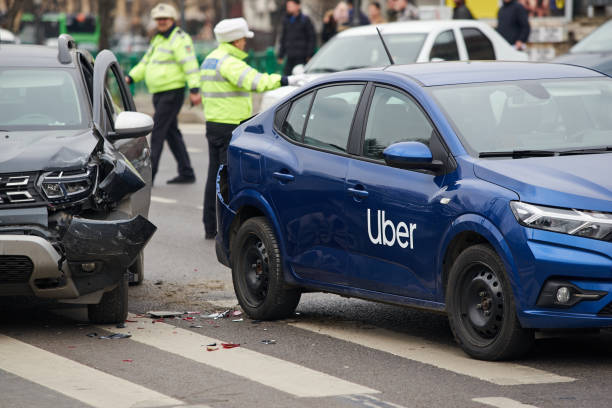Union Rideshare Accident Lawyer
Do you need a Union rideshare accident lawyer? If you or a loved one has been involved in an accident with an Uber, Lyft, or rideshare driver—whether as a passenger, another driver, or even a pedestrian—you have rights. Understanding these rights and navigating the complexities of rideshare accident claims requires the help of an experienced attorney. At Etemi Law, we are dedicated to helping victims of rideshare accidents receive the compensation they deserve.
Call us today at (203) 409-8424 for a


The Reality of Rideshare Accidents
Uber and Lyft have revolutionized transportation, providing millions of rides daily across the U.S. However, with the rise of these services, the number of rideshare-related accidents has also increased. Research from Rice University and the University of Chicago suggests that ridesharing services have contributed to a 2-3% increase in U.S. traffic fatalities since 2011, leading to up to 1,100 deaths annually.
Common Causes of Rideshare Accidents
Uber and Lyft drivers often operate under challenging conditions, increasing their risk of accidents. Some of the most common causes include:
- Distracted Driving – Relying on GPS, accepting ride requests, and managing passengers can divert a driver’s attention.
- Driver Fatigue – Many rideshare drivers work long hours or multiple jobs, leading to drowsy driving.
- Unfamiliar Routes – Navigating new areas can cause sudden stops or erratic driving behavior.
- Poor Vehicle Maintenance – Rideshare drivers are responsible for keeping their vehicles in good working condition, but lapses can lead to preventable accidents.
Connecticut Rideshare Laws and Regulations
Connecticut has strict laws governing rideshare companies and their drivers. These include:
- Mandatory Background Checks – Uber and Lyft must conduct background checks on all drivers, including a criminal record and driving history review.
- Vehicle Safety Requirements – Vehicles must pass inspections and meet specific safety criteria.
- Insurance Coverage – Rideshare companies must provide at least $1 million in liability coverage when drivers are transporting passengers.
- Driver Hour Limits – Uber and Lyft drivers can work a maximum of 14 consecutive hours and 16 hours in a 24-hour period to prevent fatigue-related accidents.
Who is Liable in a Rideshare Accident?
Determining liability in an Uber or Lyft accident can be complex, as multiple insurance policies may be involved. Our legal team at Etemi Law will investigate your case to establish liability and maximize your compensation.
If Another Driver is At Fault
- The at-fault driver’s insurance is the first line of compensation.
- If the at-fault driver is uninsured or underinsured, Uber/Lyft’s uninsured motorist coverage may apply.
If the Rideshare Driver is At Fault
- If the driver was logged into the app and waiting for a ride request, Uber/Lyft provides $50,000 per person/$100,000 per accident in bodily injury coverage.
- If the driver was transporting a passenger, Uber/Lyft provides $1 million in liability coverage.
- If the driver was off duty, their personal auto insurance applies.
Why You Need a Union Uber and Lyft Accident Lawyer
Rideshare accident cases involve multiple insurance companies and complicated liability issues. Insurance companies often try to minimize payouts, but with an experienced attorney from Etemi Law, you can fight for the full compensation you deserve.
Our legal team will: ✅ Investigate the accident thoroughly ✅ Obtain key evidence, including rideshare records and driver logs ✅ Negotiate aggressively with insurance companies ✅ Take your case to court if necessary
Contact Etemi Law Today
If you or a loved one has been injured in an Uber or Lyft accident, don’t wait. Protect your rights and get the compensation you deserve. Contact Etemi Law today for a free consultation.
📞 Call us at (203) 409-8424 💻 Visit us online to schedule your case review
In Union’s sparse winter light, Route 171 becomes a study in braking distances and close calls: black ice and accumulations of leaves compacted to glass make merges off side roads treacherous for rideshare drivers unfamiliar with the town’s narrow shoulders. I watched a late‑night pickup struggle to hold a lane while a plow cleared a single track; those small moments often turn into low-speed collisions, whiplash claims, and bruising that call for on-scene care.
Bigelow Hollow State Park and nearby Breakneck Pond are winter draws for ice fishing and cross-country walkers; rideshare dropoffs at trailheads concentrate foot traffic onto icy pullouts. When a fall results in a wrist or hip fracture, the Union Volunteer Fire Department commonly provides initial stabilization, treating hypothermia and coordinating patient packaging for ambulance crews. Remote cell coverage and unplowed access lanes can push definitive treatment timelines beyond what city riders expect.
Because the town lacks a full-service ER, many patients require interfacility transfers to regional hospitals — often over roads iced in the morning. That reality affects how rideshare incidents evolve: a driver with a minor concussion may be moved from scene to ambulance, then held for transfer by paramedics waiting for passable Route 171 segments. Rehabilitation often shifts to clinics in neighboring towns, making continuity of care vulnerable to weather-related cancellations and long commutes.
As a reporter I find the pattern clear: winter in Union turns ordinary rides into logistics problems — timing, road treatment, and where to safely meet intact. Riders and drivers should think ahead about pickup points near cleared shoulders, carry extra layers and a charged phone, and expect longer waits for ambulance-to-hospital transfers when Breakneck Pond trailheads are packed. The picture is practical, not dramatic: prepare, document conditions, and let local responders steer medical decisions.
